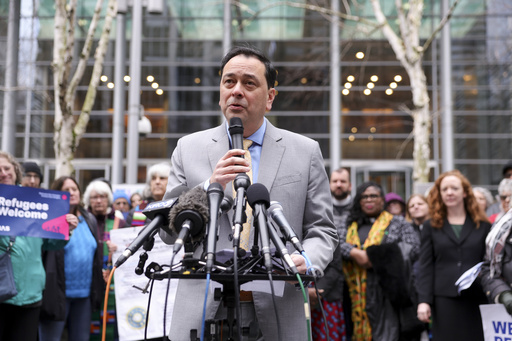In Seattle on Tuesday, a federal judge prevented the suspension of the United States’ refugee admissions program, enacted by President Donald Trump. The judge agreed with the notion that while the president possesses considerable discretion over immigration matters, he cannot override the legislation established by Congress in creating the refugee program.
The lawsuit was initiated by individual refugees whose resettlement attempts were abruptly halted, alongside prominent refugee aid organizations. These groups argued that the Trump administration’s suspension hampered their operations significantly, including the processing of refugee applications overseas and critical support services like short-term rental assistance for refugees currently residing in the U.S.
U.S. District Judge Jamal Whitehead, appointed by former President Joe Biden, assessed the arguments presented on Tuesday, concluding that Trump’s actions effectively counteracted the congressional intent behind the refugee admissions program. Judge Whitehead suggested that further elaboration on the decision would be provided through a written opinion in the coming days. “The president has substantial discretion…but that authority is not limitless,” Whitehead remarked.
A Justice Department representative, lawyer August Flentje, hinted that the government may promptly appeal the decision. President Trump had recently declared that the refugee program would be paused due to cities and communities being overwhelmed by high levels of migration. Trump cited the inability of communities to integrate large numbers of migrants, especially refugees. At present, around 600,000 individuals are in the process of seeking refuge in the U.S.
Although the refugee program has historically garnered bipartisan support, it has encountered political turbulence in recent years. Trump’s previous term saw the temporary halt and subsequent limitation of refugee entries. During the proceedings, Flentje emphasized the president’s authority to deny entry to individuals potentially harmful to U.S. interests, equating it to lawmaking power.
Flentje contested the argument that plaintiffs experienced irreparable harm warranting the judge’s intervention. He noted that most individuals whose travel was canceled had already been relocated to safer countries, and the cutoff in funding for refugee agencies was framed as a contractual issue. Nevertheless, Judge Whitehead pointed to the real-life implications faced by those affected, acknowledging the plight of refugees stranded in risky areas, families separated indefinitely, and resettlement agencies forced to dismiss staff. “Aren’t these textbook examples of harms that can’t be undone by money damages?” he inquired.
Plaintiffs in the case include the International Refugee Assistance Project, Church World Service, and the Jewish refugee resettlement agency HIAS, among others. They argued that Trump’s actions severely compromised their ability to serve refugees, both national and international. Deepa Alagesan, an attorney for IRAP, described Trump’s actions as “far-reaching and devastating,” emphasizing the lack of demonstrated harm posed by refugee admissions to the U.S. In a subsequent press conference, plaintiffs and supporters characterized refugees as an asset to the nation, not a burden.
Tshishiku Henry, an activist from Washington state, highlighted the life-altering opportunity the U.S. provided him after fleeing war-torn Democratic Republic of Congo in 2018. Standing outside the courthouse, he narrated his resettlement and expressed gratitude for the “lifeline” extended by the U.S. “You didn’t offer us just safety, but you gave us back our future,” Henry stated.
In a related case last week, a judge in Washington, D.C. chose not to immediately halt the Trump administration’s actions following a lawsuit by the United States Conference of Catholic Bishops. That particular case is set for another hearing this coming Friday.




